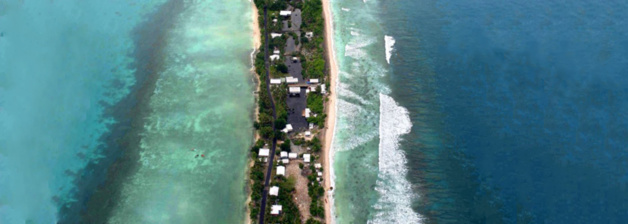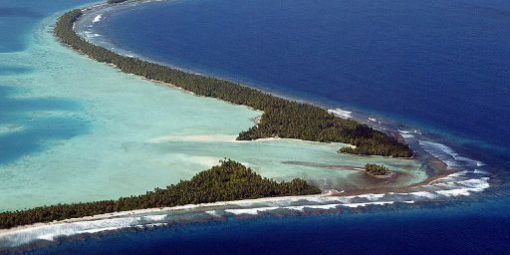
Tuvalu. Crédit Archives AP
Is Atlantis a myth? The legend has been perpetuated through centuries and through generations. But the islands the collapsed under the waters could soon appear to the real world. The volcanic eruptions that caused the islands to rise to the surface have already proven that meteorological phenomena create durable modifications for the planet. In reality, it is climate change that upsets the Earth. It has engendered a significant rise in water levels. This elevation is explained most notable by the melting of ice. When an icecap melts because the ocean has reheated, the water level rises. These icecaps were produced and have existed since the end of the Ice Age, around 20,000 years ago. Such is the context for the plea of the Prime Minister of Tuvalu, Enele Spoaga, who went to Brussels, for Europeans to diminish their carbon dioxide emissions.
In recent years, satellites have detected an elevation in the level of the waters of three millimeters per year. According to figures given by the International Climate Research Program, this rise is superior in significance compared to past centuries.
The surfaces of these two archipelagos has been reduced

Situated at sea level, both Kiribati and Tuvalu are threatened with extinction. The rising waters have already engulfed some of the surrounding islands. The Highest point in Tuvalu is five meters above sea level, with a small dam to face the wrath of the oceans. Over the past decade, the country has seen a loss of 3 meters from their beachfront. Seeing as it is the 4th smallest state in the world, some experts estimate that it will be necessary to look at photographs to see what Tuvalu will look like in 50 years
The visit of the current prime minister to Brussels is not the first plea of the country to global polluters. In 2002 the prime minister at the time, Koloa Talake, said that he wanted to file complaints against the United States and Australia. He had intended to take them to the International Court of Justice in Hague on the charge of excessive greenhouse gas emissions. He was unable to follow through with this idea due to his defeat in the following election.
The findings are similar in Kiribati. Many houses are regularly flooded. The villagers simply live with the water. This country of 811 km2 is actively seeking solutions for a better future. The doom which approaches the archipelago requires them to prepare for the inevitable. The head of state, Anote Tong, bought 20 square kilometers from Fiji for 6.4 million euros. The area is sometimes called the “refuge of the Gilbertines” by the gentle inhabitants of Kiribati. It will also serve as farmland for the country. This is the exodus for what is currently the only safe solution.
Will there be climate refugees?
The Prime Minister of Tuvalu is clear on one thing: migration is not an option. While in Brussels, he said that he could “relocate the inhabitants of Tuvalu to other countries, but that will not stop global warming. To save the world, we must save Tuvalu.” These growing problems have raised the question of climate refugees, a status that does not yet exist in international law. The court has not released a definition for such refugees. Only a draft convention was presented last year to protect those who are forcibly displaced.
Some inhabitants of the Pacific islands seek asylum and emmigrate to other countries. Ioane Teitiota, a citizen of Kiribati, made an official request for asylum to New Zealand in 2013. He requested from the Auckland appellate court a status of climate refugee. His request was denied. For the time being, that status is being debated.
Acceleration of natural disasters
Tides are rising and floods are becoming more frequent. The Pacific States face increasingly strong and fierce climate phenomena. Vanuatu is a perfect example; the archipelago was devastated by a sudden cyclone in March. President Baldwin Lonsdale directly attributed the cause of this disaster to global warming. Ecological damage is heavy, and the economy also suffers. Kiribati and Tuvalu are among the ten countries where the financial impact of climate change is most impactful.
Mostly economically underdeveloped, these countries in Oceania are faced with an adversary more powerful than they are; an opponent they cannot fight: the Earth. In response, they move in it, to achieve symbiosis with it, which starts with fighting against pollution. But the controversy lies in the fact that though Pacific inhabitants pollute less, they suffer the consequences of developed countries. “Where will these countries find their money? It falls to the industrialized countries to assume responsibility for this warming,” Ronald Jumeau, the Seychelles Ambassador for Climate Change. The reasoning of the Prime Minister of Tuvalu to Brussels will gain influence for this reason.
“In the space of a single day and a terrible night, your entire Athenian army was completely swallowed up by the earth, and the island of Atlantis sank into the sea and disappeared.” Is Atlantis a myth? Is Plato’s description accurate? Kiribati and Tuvalu will surely ask this question, for if their islands are submerged, they will become the Atlanteans.





























